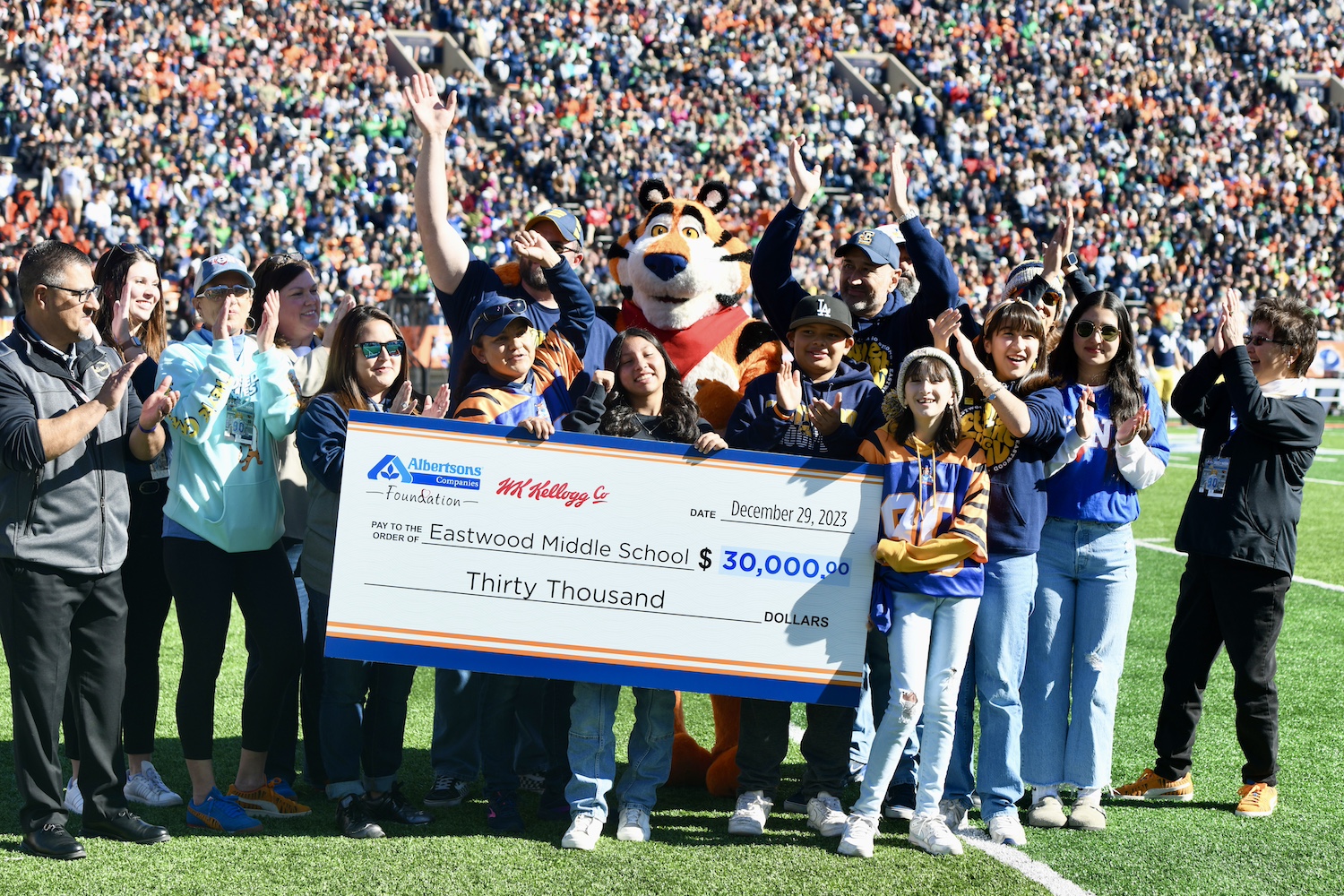
(Image courtesy of WK Kellogg Co.)
What do Simone Biles, Michael Phelps and Shaquille O’Neal all have in common?
Olympic gold medals? Not quite. They all won Olympic gold, but O’Neal threw his medal out the window driving home from the 1996 Olympic Games in Atlanta, Georgia.
The answer we were looking for is that they’ve all been featured on a box of Kellogg’s cereal.
One of the things that got those athletes to the pinnacle of their sports was the support they received throughout their youth, be it from their parents, community leaders, sports organizations or schools.
Unfortunately, not every child or young teen has access to those support systems. That’s why WK Kellogg Co. started its Mission Tiger program five years ago to fund middle school sports programs. Since 2019, the Mission Tiger program has donated over $4 million across more than 3,000 schools in all 50 states.
Doing good, and doing good for business
“We really believe that in order to withstand the test of time as a company, we need to do initiatives like Mission Tiger that do good and do good for business,” said Sarah Ludmer, chief wellbeing and sustainable business officer at WK Kellogg Co. “We can’t just make good, delicious food anymore and that be our only business approach. We know consumers expect more.”
Consumers do make purchase decisions based on a brand’s environmental and social sustainability efforts, according to an analysis by the research technology firm Glow, in partnership with TriplePundit, our parent company 3BL and panel partner Cint. The effect of consumers switching brands for sustainability reasons in the U.S. alone amounts to $44 billion annually.
When deciding on which initiative to invest time and resources in, the Frosted Flakes cereal mascot Tony the Tiger’s history of promoting youth sports made the choice clear.
“We found that middle school is the biggest time when youth are dropping out of sports,” Ludmer said. “Knowing Tony and knowing he’s always been for activity and helping kids, we just felt like this was the right fit for us.”
The program has provided 2 million "sports experiences" for youth, defined as anything the program does to help students play sports and the number of students it affects, from providing uniforms to field maintenance and everything in between.

Without partners, there is no Mission Tiger
The Mission Tiger program could not be managed without its partners. The company leans on the help of four important partners to bring its youth sport engagement objectives to life.
The Aspen Institute is Mission Tiger’s research partner. It identified the gap in middle school sports and found that youth in sports do better in school and have better social acumen.
DonorsChoose is the nonprofit partner that identifies the schools in need, allowing donations to be delivered directly.
Retail stores that sell Kellogg’s cereal are also major partners. “Whether it’s Walmart, or Meijer, or name your local retailer, they’re on a similar journey to identify programs that can reach their communities,” Ludmer said.
And the customer plays a pivotal role in the program. By purchasing Kellogg’s cereal, then uploading their receipt online, consumers trigger a $3 donation to the Mission Tiger program.
“This goes back to that doing good and doing good for business as well,” Ludmer said. “It’s one thing for a brand to tell a consumer this is what we're doing. It's another to say, ‘Hey, this is a big problem. Will you come help us solve it?’”
How can other organizations build a similar program?
“It’s super important to find programs that matter to the brand, matter to the consumer and help your retailer,” Ludmer said.
Many business-driven purpose programs, like Mission Tiger, so often fail because they become more of an add-on to the budget than a return on investment, she said. Without the business benefits, support for the project could easily fade. WK Kellogg Co. is seeing a return on its investment.
“The awareness and brand equity that we’ve seen through this, that’s one thing,” Ludmer said. “We've also seen customer response to be extremely strong because they love having community events and it gives them a way to give back — both of those from a business standpoint are beneficial for us. And then on top of that, it makes our people happy, and there's no better value or return on investment than your employees being proud of the work that your brands are doing.”
Is Kellogg’s cereal a healthy choice for youth?
“100 percent yes,” Ludmer, a dietician by trade. “I’ll be honest, cereal gets a bad rep, but it’s the number one source of whole grain and fiber that exists in the American diet.”
And the added sugar? It depends on the type of cereal, but on average, “cereal contributes less than 5 percent of the added sugar in the American diet,” Ludmer said. “The other piece to remember with this too, is it's the first meal that a kid actually makes on their own. It drives a choice level and that's super empowering for a kid.”
Empowering kids is what Kellogg’s and Tony the Tiger are known for, and who knows, one of those kids might just feature on a box of Frosted Flakes with the Olympic rings one day.

Andrew Kaminsky is a freelance writer with no fixed location. He travels all corners of the globe learning about the different groups that call this planet home, seeing natural wonders, and sharing laughs with the people he finds along the way. An alum of the University of Winnipeg's International Development program, Andrew is particularly interested in international relations and sustainable development. In his spare time you are likely to find Andrew engaging in anything sport-related, or finding common ground with new friends over a craft beer.














